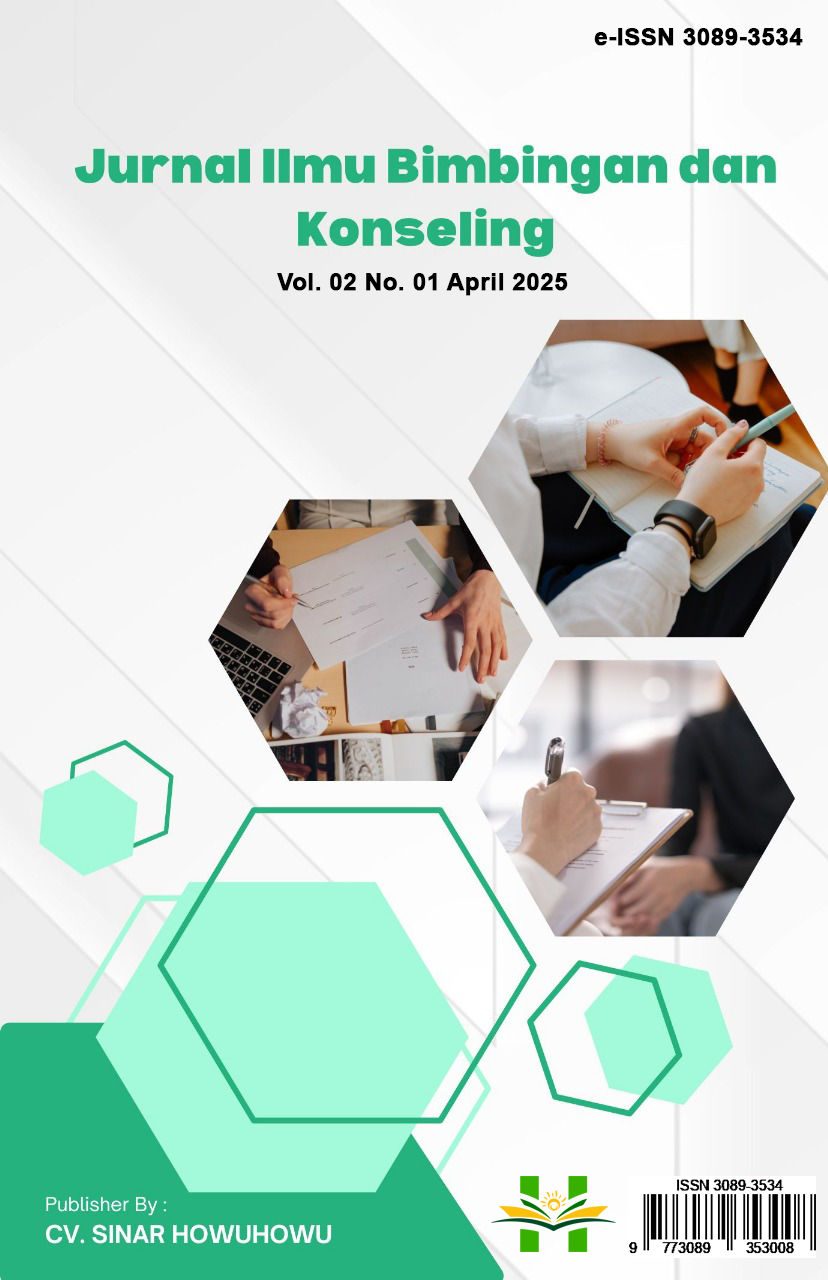Peran Konselor Sekolah Dalam Membantu Siswa Menentukan Pilihan Studi Lanjut
DOI:
https://doi.org/10.70134/bikoling.v2i1.342Keywords:
school counselors, further education choices, career guidance, decision-making, higher educationAbstract
This study aims to analyze the role of school counselors in helping students determine their further education choices and the factors influencing their decisions. The research method used is a mixed-methods approach with a descriptive design, combining quantitative data through questionnaires and qualitative data through in-depth interviews. The research sample consists of 100 students and 10 school counselors from several high schools. The findings show that school counselors play a crucial role in providing clear information about further study options and supporting students in overcoming social pressure and anxiety that arise during the decision-making process. The majority of students feel more confident and have a better understanding after participating in counseling sessions. However, challenges related to time and resource limitations hinder the ability to provide more in-depth guidance. This study suggests the need for additional support from schools and the government to enhance counselors' capacity to effectively assist students in planning their futures. Overall, school counselors play a vital role in guiding students toward better decisions regarding higher education and their careers.
Downloads
References
Amundson, N. E. (2001). Helping students choose: A practical guide for school counselors. Counseling and Development, 79(1), 46-49.
Anderson, C. S., & Roos, K. M. (2005). Counseling for the 21st century. Prentice Hall.
Baker, S. B., & Gerler, E. R. (2004). School counseling: A social-constructivist approach. Allyn & Bacon.
Ball, K., & Black, R. (2016). The role of mentors and counselors in career decision-making. Career Development International, 21(4), 365-381.
Brown, D., & Brooks, L. (1996). Career choice and development. Jossey-Bass.
Capuzzi, D., & Stauffer, M. D. (2016). Youth at risk: A prevention resource for counselors, teachers, and parents. Pearson.
Cohen, M. (2000). Theories of career development and counseling. Career Development Journal, 6(2), 115-130.
Dillard, J., & Brown, S. L. (2015). Practical approaches to career counseling. Allyn & Bacon.
Dimmitt, C., Carey, J., & Hatch, T. (2007). School counseling and the achievement gap: A national perspective. Journal of Counseling and Development, 85(3), 369-381.
Gelatt, H. B. (1989). The decision-making process: A guide for counselors. Career Development Quarterly, 37(1), 1-12.
Gysbers, N. C., & Henderson, P. (2006). Developing and managing your school guidance program. Allyn & Bacon.
Harris, L. A., & DeCoster, V. (2012). Career counseling in the digital age. Journal of Career Development, 39(3), 189-202.
Hartung, P. J., & Blustein, D. L. (2002). The role of work in psychological functioning and adjustment. Journal of Counseling Psychology, 49(3), 236-246.
Heppner, M. J., & Kern, R. M. (2010). Integrating career counseling into academic advising: Practical strategies. Journal of College Student Development, 51(6), 632-647.
Heppner, M. J., & Van Velsor, P. (2011). Career counseling and decision-making: A comprehensive model. Counseling Psychology Review, 26(1), 28-41.
Herr, E. L., & Cramer, S. H. (2008). Career development and counseling: Putting theory and research to work. Wiley.
Lapan, R. T., & Turner, S. A. (2003). School counseling interventions and career decision-making. Journal of Career Assessment, 11(1), 24-35.
Lapan, R. T., Gysbers, N. C., & Sun, Y. (1997). The impact of school-based mental health services on students' academic achievement, behavior, and well-being. Journal of Counseling & Development, 75(5), 285-290.
Lenz, J. G., & Rehfuss, M. C. (2013). Career counseling for the new century: A global perspective. Wiley-Blackwell.
McMahon, M., & Watson, M. (2013). Career counseling: Theory, research, and practice. Oxford University Press.
Meara, N. M., & Goh, K. (2017). Cultural influences in school counseling: Navigating complexities. Asian Journal of Counseling, 24(2), 112-128.
Myrick, R. D. (2012). Developmental counseling and therapy. Brooks/Cole.
Niles, S. G., & Harris-Bowlsbey, J. (2009). Career development interventions in the 21st century. Pearson.
Niles, S. G., & Harris-Bowlsbey, J. (2017). Career development interventions in the 21st century. Pearson.
Osborn, D. S., & Zunker, V. G. (2012). Casebook of career counseling interventions. Pearson.
Ratcliff, A., & Thomas, P. (2018). Exploring the effectiveness of career counseling in schools: A longitudinal study. Career Development Quarterly, 67(2), 105-120.
Rehfuss, M. C. (2014). The role of school counselors in the 21st century: A framework for the future. Journal of Career Development, 41(3), 177-191.
Savickas, M. L. (2013). Career construction theory and practice. In D. Brown, & L. Brooks (Eds.), Career choice and development (pp. 147-183). Wiley.
Seligman, M. E. P., & Csikszentmihalyi, M. (2000). Positive psychology: An introduction. American Psychologist, 55(1), 5-14.
Downloads
Published
Issue
Section
License
Copyright (c) 2025 Nidaurrohmah (Author)

This work is licensed under a Creative Commons Attribution-ShareAlike 4.0 International License.













